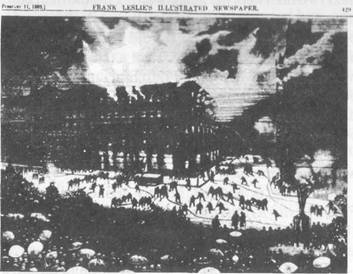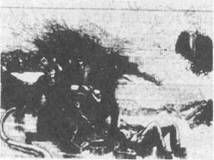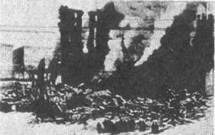That part of the account is entirely right. It was beautiful to see that cable smack the side of the building when the boy let go of it; to see it hanging, then, to within a few feet of the walk; and to see the first man swing out onto it, and to see it hold. Each of the next two men kept his head, waiting till the man before him was on the ground. But they all slid too fast, burning their hands. And we did cheer Wright when he got down from the pole. I got a ten-dollar yellowback from my wallet, gave it to him, and half a dozen others gave him money; one man gave him a gold piece. The three rescued men came over, found the boy, shook his hand, and led him away with them, and I'm sure they must have done something for him, too, which he damn well deserved.
Following is a page, greatly reduced in size, of Frank Leslie's Illustrated Newspaper of February 11, 1882, showing Charles Wright up on the pole unfastening the wire to save the three men.
Julia and I were working our way through the crowd along Beekman Street, when all around us heads turned to look east. Just ahead, on the other side of a narrow alley, the wooden scaffolding of a big, new, still-unfinished stone building suddenly broke into flame; the fire had jumped clear across the street. The front of the building rose into two towers, higher than anything else around, and now the flames shot up the scaffolding to reach the towers. There it caught the window frames, in which glass hadn't yet been set, and ran up and along the eaves, gabled roof-lines, and the ornate railings of the tower rooftops. It was a sudden weird strange spectacle of burning rings, squares, triangles, and the parallel lines of the railings, like an enormous Fourth of July set piece seen high in the air through a snowstorm, and I think the crowd turned to it, as we did, in relief from the things we'd been seeing.





But while we were watching, a young woman had crept out onto a fourth-story window ledge of the burning building, and when I turned and saw her I wondered if she'd been inside all this time; maybe running from one side of the building to another till she found this one not yet on fire. Just above her, fire roared out of the fifth-story window as though it were fed by forced draft, the tongues and billows of orange flame shooting halfway out over the street like a kind of squirming canopy over her head. She wasn't panicked, though; she closed the window behind her, careful to pull it all the way down. Then she stood, raised her arms above her head, and put a hand on the window opening on each side, supporting and steadying herself. It was an astonishingly calm posture. There she stood, not shouting, not screaming, but simply looking down at us, waiting. She must have known there was no going back: that this window was her last chance, and that there wasn't much time before the fire burst through it behind her.
And nothing was happening, no fireman coming with a ladder below. I suppose they thought, and they couldn't be blamed, that no one else would appear at a window along here at this stage of the fire. The girl stood waiting, in her long black dress, arms outstretched, hands on the sides of the window opening which framed her; she wore a white scarf tied around her neck. Suddenly the glass broke behind her, and a tremendous gout of black smoke filled the entire window, rolling on out and hiding her completely. Near us a woman cried out, anguished, and the crowd stirred, muttering. Down the line somewhere a man was shouting angrily for a ladder. Out on Beekman Street a cop ran past us fast as he could go.
There was no flame in the black smoke pouring out over the ledge up there, and we all — every last soul in that crowd, I'm certain — held our breaths: Would she be gone when we saw the ledge again? Julia didn't know it but she had both hands on my forearm, squeezing, squeezing.
The wind pulled the smoke away fast and she was still there, one hand on the window frame, the other cupped tightly over her mouth; now she struck her chest hard and we could see she was coughing. Then again she stood, arms outstretched between the stone sides of the opening, looking down at us and waiting, and the crowd was murmuring at her calmness and bravery. Minutes passed; a man near us stood staring up at the girl and cursing steadily; he may not have known he was doing it. Then, finally, two firemen came running around the corner from Nassau Street carrying an extension ladder. But at the building wall they stood, still holding the ladder, and talking, one man shaking his head violently. The cop at the police line had run over to them, and now he ran back: "Ladder's too short!" he yelled to us. One fireman began running back the way he'd come, then stopped — I never knew why — and came running back. And now they lifted the ladder up against the building and rattled the extension up fast, the ladder tops bouncing against the wall as it rose.
It was too short. There was newspaper criticism, in days that followed, of the shortness of fire-department ladders in a time when many buildings were four, five, and six stories tall, and newer ones ten. This ladder, raised to its highest now, touched the wall a good four feet below the girl's ledge; and now again a great slow billow of soot-black smoke rolled across the window-sill behind the girl, and covered her completely. She'd have died, I'm certain, lost consciousness and fallen back into the building or out and down onto the street, except for the wind. It snatched the slow roll of smoke and sent it flying in thinning fragments along the face of the building, and we could see the white scarf and the black skirt fluttering.
I want to explain. Since we'd stepped out of the Times Building doorway onto the street and seen the burning building, I'd been silently talking to myself. I didn't really blame myself for failing to burst through into Jake Pickering's office and stamping out the tiny new fire when I could have; no one could have anticipated what so suddenly happened. What ate at me now was this: that by our hidden presence at that old event Julia and I might have changed its course in just the way Dr. Danziger had always been afraid of. Perhaps we'd made a tiny sound, for example, barely heard and hardly noticed by Carmody as he searched through the files. Yet even a tiny, hardly noticed sound might very slightly have affected his subsequent actions. So that he'd dropped his burning match an inch to one side, say, landing it on the paper it set alight. Otherwise, if we hadn't been there to make even the least sound, who could say but what his match would have fallen onto bare wood? And that he might simply have stood, then, and watched it burn out?
I knew Julia must be agonizing through her thoughts, too: these were real people we'd just seen die. And now this incredible girl stood high over the street above us, waiting in silent courage to either die or somehow be saved in what now had to be only a matter of seconds.